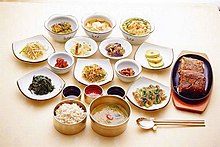Muk (food)
Appearance
| Muk | |
 A plate of dotorimuk muchim | |
| Korean name | |
|---|---|
| Hangul | 묵 |
| Revised Romanization | muk |
| McCune–Reischauer | muk |
Muk or mook is a generic term referring to Korean dishes made from grains, beans, or nut starch such as buckwheat, sesame, and acorns, which have a jelly-like consistency. Such foods have little flavor on their own, so muk dishes are seasoned with soy sauce, sesame oil, chopped scallions, crumbled gim (Korean laver), and chili pepper powder, and mixed with various vegetables.[1]
Types
There are several types of muk:[2]
- Dotorimuk (도토리묵), made from acorn starch
- Memilmuk (메밀묵), made from buckwheat starch
- Nokdumuk (녹두묵), made from mung bean starch
- Hwangpomuk (황포묵),(also called norangmuk), made from mung bean starch, and colored yellow with gardenia coloring
- Kkaemuk (깨묵), made from sesame seeds
Muk dishes

- Mukmuchim (묵무침), muk dish seasoned with ganjang (Korean soy sauce), sesame or perilla oil, finely chopped green onions, sesame seeds, and red chili pepper power. It can be mixed with sliced or shredded cucumber, and leaf vegetables, such as chopped lettuce, cabbage or napa cabbage. The dish can also be served with only crumbled gim (Korean laver) added as a garnish.[3]
- Tangpyeongchae (탕평채), made with thinly sliced nokdumuk, beef, vegetables, and seaweed.[4]
- Mukbokkeum (묵볶음), a stir-fried muk dish.[1]
- Mukjangajji (묵장아찌), marinated muk in ganjang[5]
- Mukjeonyueo (묵전유어) or mukjeon (묵전), made by pan-frying sliced muk that has been coated with mung bean starch.[6]
- Muksabal (묵사발) or also called mukbap (묵밥), cold soup made with muk and sliced vegetables.[7]
See also
{{{inline}}}
References
- ^ a b Template:Ko Muk at Encyclopedia of Korean Culture
- ^ Template:Ko Muk at Britannica Korea
- ^ Template:Ko Dotori mukmuchim at Doosan Encyclopedia
- ^ Template:Ko Tangpyeongchae at Encyclopedia of Korean Culture
- ^ Template:Ko Mukjangajji at Doosan Encyclopedia
- ^ Template:Ko Muk jeon at Doosan Encyclopedia
- ^ Template:Ko Muksabal, The Academy of Korean Studies
External links
- Muk recipe at Korea Times
Wikimedia Commons has media related to Muk (food).
 |
| This article is part of a series on |
| Korean cuisine 한국 요리 조선 료리 |
|---|
